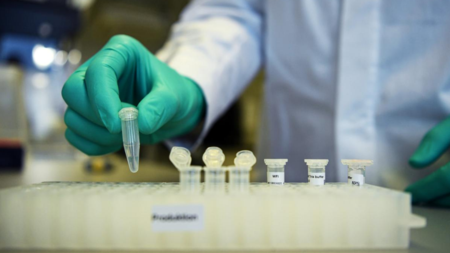
Editor's note: Bradley Blankenship is a Prague-based American journalist, political analyst and freelance reporter. The article reflects the author's opinions and not necessarily the views of CGTN.
Weeks ago, U.S. President Joe Biden told the world at the Munich Security Conference that "America is back," but a recent Reuters exclusive suggests otherwise. Citing two European Union (EU) sources, the news service reported that Washington told the EU not to expect to receive AstraZeneca COVID-19 vaccines manufactured in the U.S. any time soon.
This follows a feud between AstraZeneca and the European Commission after the drug company cut its supplies to the 27-nation bloc due to supply chain issues, hoping to plug up this error with vaccines produced outside of Europe, including some in the U.S.
The bloc fought hard to reach this deal with the British-Swedish drug company because AstraZeneca's vaccine was supposed to be a key part of the EU's vaccine rollout operation. Now that looks to be in serious jeopardy.
While it's not yet known exactly what the basis is for this block, a few things are known. First, the U.S. has made it clear from the start that it's priority is to inoculate its own citizens first, which Biden repeated on March 10. Second, while the AstraZeneca vaccine is not yet approved for use in the U.S., as Operation Warp Speed chief advisor Dr. Moncef Slaoui said in December, it could get the greenlight by April.
So might the U.S. actually be planning to block shipments of the AstraZeneca vaccine to the EU in order to accelerate its own vaccination rollout? Well, there are clear domestic political pressures for the Biden administration to block the vaccines from being exported given the state of American politics.
First of all, Americans have endured a difficult year after over half a million of their fellow citizens died from COVID-19. They are looking to get back to a normal life, especially as many millions face tremendous economic hardship.
The Republican Party, the opposition party in the U.S., and its backers, all of whom have run wild with the "America First" mindset, would use this as an attack line in the hugely important 2022 midterm elections and in the next 2024 presidential election. Without exaggeration, it could even spur acts of domestic terrorism. These are very real calculations to go through for the Biden team.

U.S. President Joe Biden arrives at Mitchell International Airport in Milwaukee, Wisconsin, U.S., February 16, 2021. /Reuters
U.S. President Joe Biden arrives at Mitchell International Airport in Milwaukee, Wisconsin, U.S., February 16, 2021. /Reuters
For the rest of the world, even if the U.S. blocks a portion of these EU-claimed vaccines from being exported or if the situation merely turns out to be some bureaucratic hangup, the tension this would create would still be damaging.
The situation in Europe is fragile and EU citizens are frustrated with the EU itself and their national governments over a slow vaccine rollout that has been fraught with issues. As such, member states and their leaders are becoming more and more desperate to find solutions.
For example, days ago Italy blocked shipments of 250,000 doses of the AstraZeneca vaccine to Australia because of short vaccine supplies in the EU and an increasingly desperate situation driven by the spread of new COVID-19 variants.
Italy's heavy-handed measure was done with the backing of EU vaccine export controls that are set to end by the end of March, though it remains to be seen if that will be lifted on schedule if the U.S. fails to export to the EU.
In the case of Australia, Italy's actions were at least understandable since the situation there is well-controlled, but, as always, the many poorer countries that are reliant on the richer countries like the U.S. and those in the EU for vaccines would suffer the most if strict controls were enforced.
In the long-run, hoarding vaccines will only prolong humanity's tangle with the COVID-19, because as long as the virus is spreading at a high rate somewhere then the potential for new mutations will always exist. As the saying goes, no one is safe until all of us are safe.
At least for now, we are nearing the point of vaccine nationalism that many feared. One year into this pandemic, the situation now regarding vaccines bears strong resemblance to the worldwide scramble for medical supplies during the initial global outbreak of COVID-19 when many countries were acting out of pure self-interest. History will certainly judge some countries and leaders more than others for their selfish actions.
(If you want to contribute and have specific expertise, please contact us at opinions@cgtn.com.)

